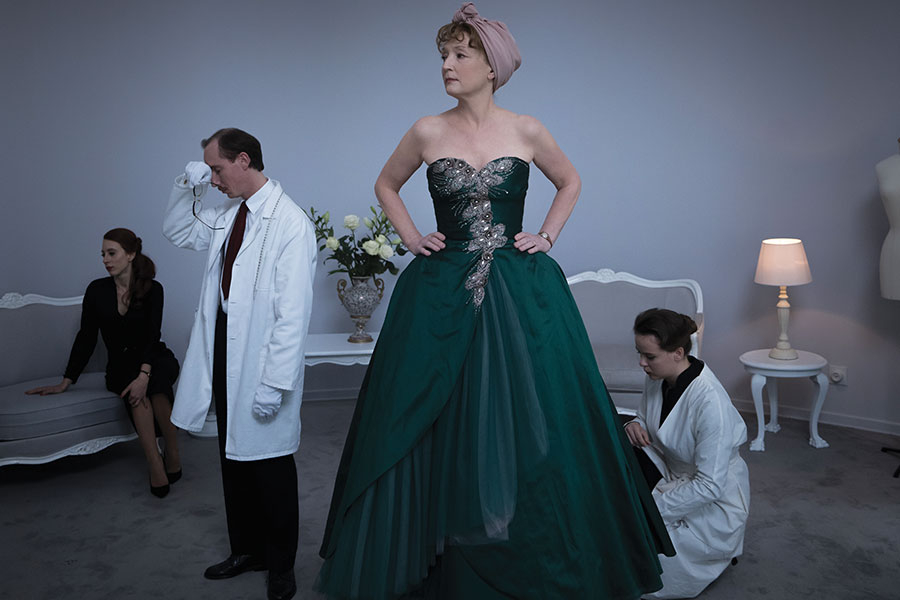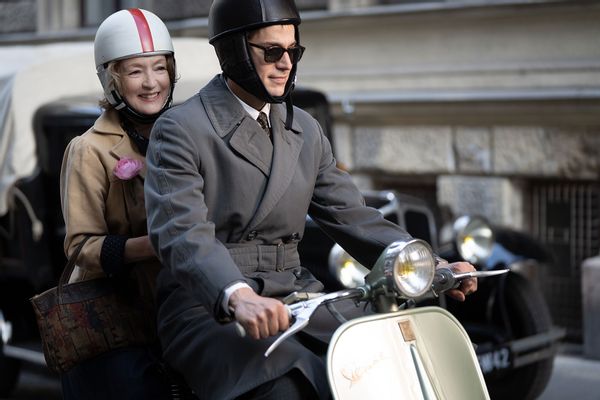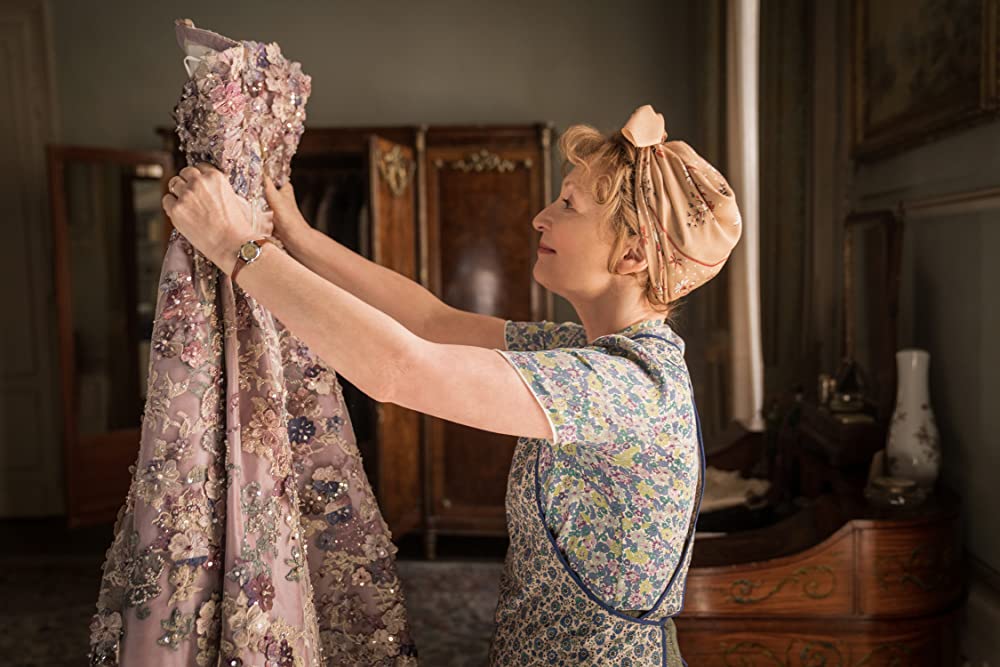 |
None of the images in this post are mine; all credit to the original owners. |
For Father's Day, only two of my siblings were at home, and once they were in bed, my parents decided to watch a newer movie: Mrs. Harris Goes To Paris. And of course, I watched with them. (I hadn't watched a movie since the beginning of June--long story.)
Now, I'm not sure if this movie made such a big impact on me partially because I hadn't seen anything else all month, but it made a big impact on me. And I immediately decided that I wanted to write a blog post about it.
So, here we are. ;)
In case you're not familiar with Mrs. Harris, here's a synopsis, courtesy of IMDb:
In partnership with the House of Dior, "Mrs. Harris Goes To Paris" tells the story of a widowed cleaning lady in 1950s London who falls madly in love with a couture Dior dress and decides that she must have one of her own. After she works, starves, and gambles to raise the funds to pursue her dream, she embarks on an adventure to Paris which will change not only her own outlook, but the very future of the House of Dior.
Overall, the movie was amazing. It was paced perfectly, and was what my family calls a "mean movie", one wherein one is made to care deeply and passionately about what the main character wants, much to one's own pain when they encounter problems in reaching their goal. The cinematography was gorgeous, the characters' accents were perfect, the characters themselves were lovable.
To cap all of this off, the whole movie made me think that it was much older than it actually was. I was shocked to find out that it was released in 2022--shocked in the best possible way. (At this point in filmmaking, me thinking that a movie is old is a massive compliment.)
So, I loved it. But there were a couple of things that made me want to write an entire blog post about it:
-The movie looked with a loving eye at every character in a really remarkable way
-It featured one of the more beautiful female friendships I've ever seen in film (And you guys probably have some idea of how much fictional female friendships matter to me, given that I wrote an entire post on them a while back.)
-It depicted in a very real way the importance and essentiality of beauty (that last reason was the real catalyst, but I want to talk about the other things, too)
-It featured one of the more beautiful female friendships I've ever seen in film (And you guys probably have some idea of how much fictional female friendships matter to me, given that I wrote an entire post on them a while back.)
-It depicted in a very real way the importance and essentiality of beauty (that last reason was the real catalyst, but I want to talk about the other things, too)

The movie looked with a loving eye at (nearly) every character
This was truly remarkable, actually.
Obviously, the movie focuses around Mrs. Harris, who is a war widow (only she doesn't know it until the beginning of the movie) and works as a maid/housekeeper/cleaner in several rich peoples' houses to make ends meet. She lives in a poor but clean and tidy and homy little apartment in a basement. She doesn't have lovely clothes--she has housekeeper clothes like any other housekeeper. She's not romanticized--she has the accent that someone in those circumstances would have, she has a knack for saying the wrong thing at the wrong time, she can be naive and far too trusting, and she doesn't understand nor take to the fashion world. An unlikely choice for a heroine, and yet she is the heroine, and the movie makes you understand her point of view, her drudgery of a life, and why seeing a Dior dress ignites a passion in her that cannot be quenched. The movie sees her with the eyes of love, and lets the audience do so as well.
But Mrs. Harris herself is only the beginning. She may be an unlikely heroine, but three homeless (possibly drunk) men that she meets in the train station are even more unlikely as heroes (or at least trustable people). She goes into the station needing a place to spend the night, and there are these three men sitting around drinking and looking raggedy--the kind of men who one would stay away from. And yet, they offer her food and wine, and watch over her while she sleeps, and then guide her to where she needs to go in the morning. The movie offers them to be more in the eyes of the viewer than just homeless drunkards. I found that very beautiful.

Mrs. Harris then meets a possibly slightly avaricious financial officer of Dior. He seems slightly inclined to keep his hands on her cash when they first meet, until a chivalrous gentleman rescues her. And yet, when she needs a place to stay, this man offers her one, feeds her, eats her British cooking (although it's a bit of an effort), and she finds that he is not truly a grasping man, but one who is concerned about his future, and grieving things that he thinks he will never be able to have. Even if he doesn't quite, himself, realize it. (He is rather oblivious. I like that about him. He reminds me of myself.)

It featured one of the more beautiful female friendships I've seen in film
Mrs. Harris and Vi (to her right in the picture above) are one of the most lovely and lovable friendship duos I've come across in quite a while! They met while they were building planes together during WWII (I love this), and live next door to each other. Mrs. Harris's husband is dead, and Vi doesn't seem to have a husband in the picture, either, and they support each other. They're there for each other.
Vi drags Mrs. Harris out of her funks into the real world, and makes sure that she, as an introvert, gets enough extravert time. She supports Mrs Harris's dreams, even when she thinks that they are absolutely bonkers (although she does try to shield Mrs. Harris from the craziest things that she wants to do to get herself to Paris). Whereas it seems like Mrs. Harris is Vi's anchor, keeping her moored to the real world, keeping her realistic, being her sounding board. They bounce off each other, joke with each other, check on each other, comfort each other, and encourage each other.
Let me tell you, it's a beautiful relationship--made up of a lot of small moments. And I love it for that.

And here we come to what is, in my opinion, the most important theme of the movie. The theme that beauty is for everyone.
The plot of the entire movie is kicked off by Mrs. Harris seeing her employer's Dior dress and being captivated by it. The image of the 50-something housecleaner being swept away by the beauty of this dress is...well, perhaps it's unusual, but I think it's also touching. Even though Mrs. Harris's life is bereft of any but the most elementary beauty (the beauty of a small garden and a cozy house is not to be underestimated, of course), she recognizes the beauty of this dress. She, like everyone else in the world, has an innate sense for beauty which has not been blunted by the fact that she doesn't get to see beauty very often.
And she decides that she wishes to set off in search of this beauty--to get some of it for herself. That alone is something beautiful to me--someone, in a modern film, deciding that what they want to pursue is not power, or fame, or pleasure, but beauty.
It also reminds me of what C. S. Lewis once said about beauty, something along the lines of "we all wish to be one with the beauty, to get inside the beauty, but that will never truly happen until Heaven". (That was not a direct quote, if you couldn't tell. XD) Mrs. Harris has this innate longing for beauty just like the rest of us, and while, like the rest of us, she can't enter fully into the beauty until heaven, a Dior dress would get her pretty close, at least, she thinks so. Humans long for beauty, as we also long for goodness and truth. But I think of all three of those characteristics, beauty is the most underestimated in today's culture.
There's a theme stated a couple of times in different ways throughout the movie, that beauty is worth it. In a world where the 'greatest good' of society is seen as production, as a high GDP, and a world wherein people are quite often only valued because they are useful, the fact that there is a movie where characters say both in so many words and not in so many words that beautiful things are worth buying, even if they are expensive, is quite a statement. And it's a statement made in several ways, from characters directly saying it, to the Dior dresses, to the buying of superfluous flowers merely to make Mrs. Harris happy. But the movie is correct. While beauty may not put food in your mouth, it is one of the things that is essential to humanity. Beauty is necessary. And Mrs. Harris, as well as many of the other characters in the film, understands this. While goodness and truth are often seen as ends to production and (even, sometimes) to human happiness, beauty is often left by the wayside, despite its necessity.
As G. K. Chesterton says, "We are perishing for want of wonder."
And as Dostoevsky said, and JPII happily repeated in his Letter to Artists: "Beauty will save the world."
Mrs. Harris understands the necessity of beauty. Beauty makes an impression on her, and she will scrimp and pinch and go to the ends of the world (or at least to Paris) in order to find it, to acquire it, to bring it back. And she finds along the way not only beauty, but also goodness and truth.
One of the other things I love about Mrs. Harris's search for beauty is that she is no longer young. She's a middle-aged woman, and yet, beauty is still necessary to her. And the movie makes it very clear that just because she isn't young and has been cleaning people's houses for years doesn't mean that she cannot be beautiful. Not only does it not mean that she can't have something beautiful, but it also doesn't mean that she can't, herself, be beautiful. And she is--beautiful, that is. But in a different way than the young Natasha. And the movie doesn't hold one type of beauty up as better than the other.
One might object that sometimes people truly cannot afford beauty, at least, to the scope of a Dior. This is true, and also addressed by the movie. Towards the end, having been influenced by watching Mrs. Harris's remarkable search for beauty, a character suggests that it is critically important that Dior move past merely haute couture, and start making things of beauty that can be afforded by any woman. Because every woman desires the beautiful things--and every woman needs to have access to beauty, not in order to be vain, nor primp herself up, but because beauty is necessary, and every human desires to enter into it.
And I think that this is quite the best ending for the movie. (Well, that's not the whole ending. But it's a part of it. I'm trying not to give spoilers, of course.) Because one of the main 'points' of the movie is the impact that Mrs. Harris's search for beauty and humble desire to have something beautiful (not out of greed, nor vanity (she has nothing to be vain about, and basically says so)) have on the people around her, from the financial officer at Dior to Christian Dior himself. And the result of the impact is the desire to help more people like her acquire beauty for themselves. Which is, in my opinion, an extremely satisfactory conclusion to her search for beauty--finding it for herself, but also for others.
So...thoughts? Have you seen this movie? What's your favorite movie with a middle-aged protagonist? What is one of your favorite beautiful things?

I have not seen this version of this movie, but I really want to. I love the '80s version that has Angela Lansbury and Omar Sharif in it, and I really enjoyed the book when I read it years ago. I'm glad to hear this version is lovely in every way!
ReplyDeleteOoh, I had heard that there was an '80s version, but I haven't seen it! Now I'm curious. I hope that you get to see this one soon, though, and I'd be curious to hear your thoughts! :)
Delete